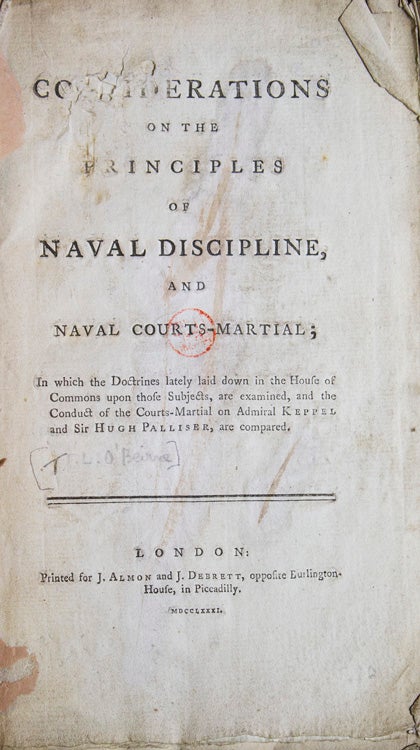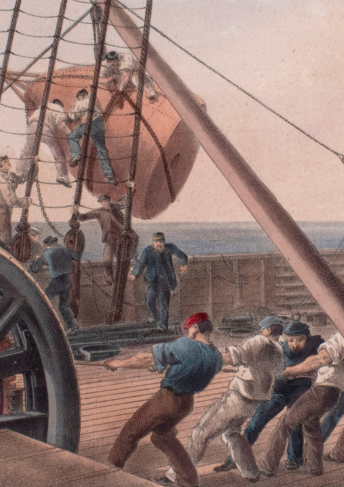
Courts Martial of Keppel & Palliser, during the American Revolution
Considerations on the Principles of Naval Discipline, and Naval Courts-martial; In which the Doctrines lately laid down in the House of Commons upon those subjects, are examined, and the conduct of the courts-martial on Admiral Keppel and Sir Hugh Palliser, are compared.
London: Printed for J. Almon and J. Debrett, 1781.
Price: $1,250.00
About the item
First edition. [A2], B-2B4. [4], 190, [2, ad] pp. Errata leaf follows title page. 1 vols. 8vo. Courts Martial of Keppel & Palliser, during the American Revolution. Uncut in later drab wrappers (chipped and torn, lower wrapper especially). Title leaf soiled with abrasion costing four letters in first line. Some old folds and minor soiling, bottom corner of last leaf crumpled. ESTC T 9693.
Item #217548
Written by Thomas Lewis O’Beirne (1748?-1823), the Anglican divine, whose first publication was the sermon he preached (“An excellent sermon preached in St. Paul's Church, New-York”, NY, 1776), as chaplin in Lord Howe’s fleet, at St. Paul's Chapel in New York after the disastrous fire in New York City of September 21, 1776 (probably set by Patriot arsonists). Upon his return to England in 1779, O’Beirne wrote a defense of Howe in “A Candid and Impartial Narrative of the Transactions of the Fleet …” (L., 1779), and became more and more allied with the Whig party.
This is his defense of Admiral Keppel in the politically charged dispute with Sir Hugh Palliser and Lord Sandwich over their actions in the engagement with the French fleet off the coast of Brest in July, 1778. Charges and counter-charges flew over that indecisive and costly encouter, Kessel being accused "misconduct and neglect of duty" and of not having done enough to finish off the crippled French fleet. Indeed, a claim was made at the time “that had the French been defeated at the time, a diplomatic mission to America, giving them the opportunity to abandon the French treaty, would not have failed” (DNB) Palliser, on the other hand, was accused of neglecting to obey an order to come to the support of the rest of the fleet. The dispute ultimately resulted in court-martials of both men, resulting in the acquittal of each, although Palliser was censured and ruined, while Keppel refused to serve under the current Ministry.
“The whole episode had severely weakened the standing of the Navy. Keppel asked not be sent to sea under the current Ministry, and so the Admiralty retired him, which led to a general resignation by his naval supporters, depriving the Navy of many able officers in the continuing war against America.” — DNB
The first edition of O’Beirne’s account of the two court martials, although well represented in institutions, is rare on the market; and only one copy of the 2nd edition has appeared at auction over the last 30 years.

